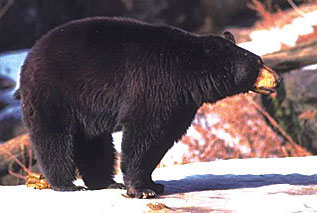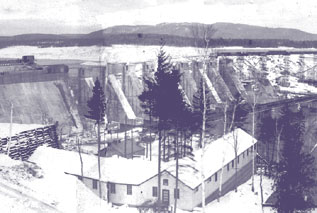 |
Shaped by the Past
Several periods of glaciation ravaged this landscape
leaving behind granitic gneiss outcrops, sand and
gravel beds. Surrounded by wetlands and lakes, the
town lies between Algonquin Park and the Ottawa
River, which provides habitat for pickerel [walleye]
and the now-rare lake sturgeon. A mixedwood forest
of white, red and jack pine, white and yellow birch,
red maple and red oak once dominated the region.
Cut for lumber from 1840 onwards, its descendents
are found as a secondary growth around town.
The Eastern Canadian wolf is found in the large,
relatively pristine habitat of the AECL Chalk River
Laboratories. When food in the wild is scare, black
bears amble into town to feed from domestic fruit
trees. Migrating birds pass through the Ottawa Valley
each spring and fall, and a myriad of waterfowl
and warblers can be viewed here particularly in
those seasons. Many species nest in the area including
the ruby-throated hummingbird, which arrives here
in early May and stays until September. Not to be
outdone, Monarch butterflies wing-beat their way
from Mexico to Deep River to lay their eggs on milkweed.
Elegant pink lady’s-slippers and graceful
ferns can be found in the shady woodland. |
| |
|
|
 |
A Planned Community
For centuries First Nations peoples, explorers,
fur traders and lumbermen used the Ottawa River
to pass through the Deep River area. Settlement
occurred in the 1800s, but it was not until the
1940s that major changes occurred to shape the communities
of today.
In 1944 many local residents had to leave their
homes because the Canadian Government expropriated
their land to build a nuclear research site in support
of the allied war effort. The new facility at Chalk
River was to be staffed by world class European
scientists fleeing the rise of Nazi Germany. However,
World War II ended before the new laboratories were
operational, so Canada used the new facility for
the development of peaceful nuclear technologies.
Deep River was designed by architects from Montreal’s
McGill University as the housing community for the
Chalk River employees. About this time, the entire
area was also bolstered by the construction of a
hydro generating dam and Ontario Hydro’s nuclear
training facility at Rolphton. Today, Deep River
is still reliant on the Chalk River Laboratories
for much of its economic activity, but tourism,
retirees, military families and a vibrant service
sector combine to create a modern and diverse community. |
| |
|
